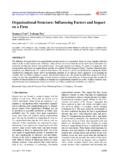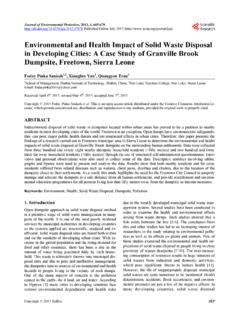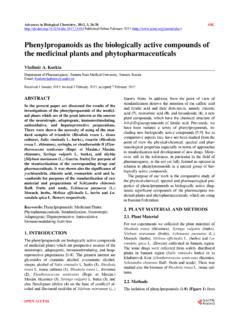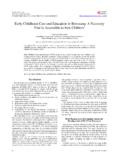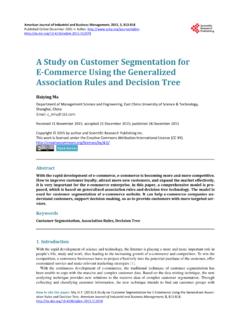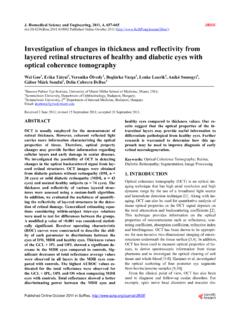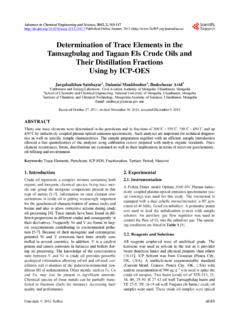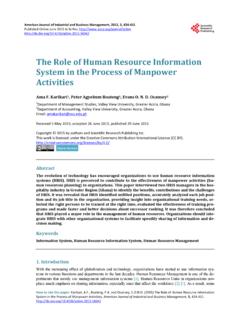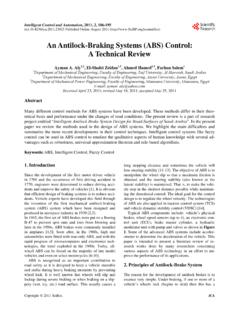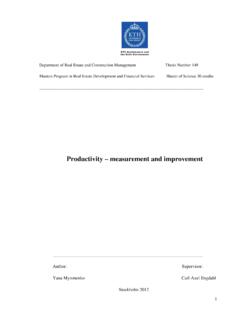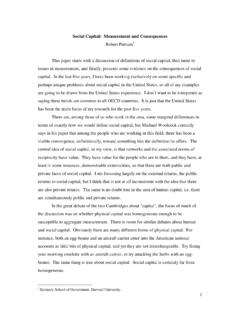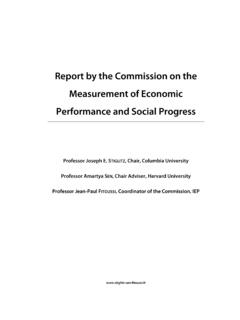Transcription of A Survey of the Effect of Social Media Marketing on Online ...
1 Journal of Service Science and Management, 2014, 7, 368-376 Published Online October 2014 in SciRes. How to cite this paper: Mohammadpour, A., et al. (2014) A Survey of the Effect of Social Media Marketing on Online Shop-ping of Customers by Mediating Variables. Journal of Service Science and Management, 7, 368-376. A Survey of the Effect of Social Media Marketing on Online Shopping of Customers by Mediating Variables Alireza Mohammadpour1, Taher Roshandel Arbatani2, Tahmoures Hassan Gholipour3, Fereshteh Farzianpour4*, Shadi Hosseini1 1 Department of Management, University of Tehran Kish International Campus, Tehran, Iran 2 Department of Media Management, Tehran University, Tehran, Iran 3 Department of Management, Tehran University, Tehran, Iran 4 Department of Health Management and Economics, School of Public Health, Tehran University of Medical Sciences, Tehran, Iran Email: Received 7 September 2014; revised 2 October 2014; accepted 25 October 2014 Copyright 2014 by authors and Scientific Research Publishing Inc.
2 This work is licensed under the Creative Commons Attribution International License (CC BY). Abstract The present study aimed to evaluate the Effect of Social Media Marketing on Online shopping of customers based on mediating role of value capital , relational capital and brand capital by path analysis method. 169 students of Tehran University were included in this study. They filled out the questionnaires of Social Media Marketing , value capital , relational capital , brand capital and e- shopping of customers. The results of path analysis showed that Social Media Marketing had posi-tive and significant impact on value capital , relational capital and brand capital . The direct Effect of relational capital on value capital and brand capital was direct, positive and significant.
3 Three variables of value capital , relational capital and brand capital had a direct and positive and signif-icant Effect on e-shopping of customers. Social Media Marketing had indirectly positive and signif-icant impact on e-shopping of customers via value capital , relational capital and brand capital . Re-lational capital by value and brand capital had indirect, positive and significant impact on e-shop- ping of customers. Generally, the results of the present study supported mediating role value cap-ital, relational capital and brand capital variables in relationship between Social Media and e- shopping of customers. Keywords Brand capital , E-Shopping Behavior, Relational capital , Social Media Marketing , Value capital *Corresponding author. A. Mohammadpour et al. 369 1. Introduction Today, e-commerce is one of the important issues in business.
4 E-commerce improves communication and open economy at national and international level, changing business method and changing traditional markets to its new forms. One of the new purchase methods with great advantages is e-shopping. Now, the majority of trans-actions are done by this method all over the world. According to the findings of the studies, more than half of pioneer companies income is via electronic selling of their products [1] [2]. The benefits of usage of customers of e-shopping are based on developing the business, increasing sale and income, reduction of costs, indirect re-lationship between buyer and seller, increasing speed of affairs, reduction of costs of advertisement, relationship with customer or other tradesmen and it is provided at any time or place [3] [4]. Despite the researches in identi-fication of effective factors on deciding to use e-shopping of cognitive, attitude and value variables, the ques-tions increasing the decisions of customers to e-shopping are not answered completely [5] [6].
5 The identification of effective variable on decision of customers to use e-shopping is important for many organizations as it pro-vides the opportunity of reducing the costs and increasing profit and it is effective on many performance fields in organizations. Social Media Marketing as a developing phenomenon plays an important role in the tendency of e-shopping of customers. Also, there are a few studies regarding the Effect of Social Media Marketing on e- shopping of customers. The other important factor of this study is the evaluation of mediating role of value cap-ital, relational capital and brand capital and this is less emphasized in any study. On the other hand, despite the increasing development of using internet in Iran, e-commerce and e-shopping are not common yet. People are not anxious to buy the products and services via internet of organizations facilitating this process [7] [8].
6 On the other hand, Social Media Marketing is a new phenomenon playing important role in products or services market-ing of companies and it improves the tendency of customers to purchase [9] [10]. Social Media are those availa-ble easily and they lead to communication development. This advantage causes that the companies and organi-zations apply it to introduce their products and goods and affect the attitude of people to use e-shopping. The main question of the present study is whether value capital , relational capital and brand capital play a mediating role in relationship between Social Media Marketing and customers decision to use e-shopping? Theoretical Basics According to Keller (2001), Marketing relation is a tool by which the companies can inform, motivate, stimulate and recall the consumers regarding their brands as directly and indirectly.
7 Marketing relations enable the organizations to discuss with their consumers and they can advertise their brand by this relationship [11]. There are various types of Marketing relation methods as all forms of advertisement, activities in public relations, Marketing and personal selling [11]. O Shea & Alonso (2011) referred to websites, blogs, face book and tweeter as new tools of Marketing relation by which the organizations can communicate with fans and stockholders. E- shopping: In 21th century, a revolution is seen in people purchase. New technologies as internet, web, digi-tal TV and video telephones made going to the stores as unnecessary process. Electronic access is developed and trading is easier and rapid without physical limitation [12]. Online trading is composed of three important com-ponents as information retrieving, information transfer and product purchase.
8 Online trading has three different features compared to traditional trading. These three features include: 1) It applies extended technology; 2) Uncertainty, temporary and non-personal features of transaction in on-line space; 3) Explicit trading, unpredictability of technological equipment in trading and on-line transfer [13]. Thus, from specific nature of internet, inclination to purchase depends upon accepting E-commerce and cus-tomer evaluation of website of the company and it is important in customer decision making and purchase expe-rience [14]. In an investigation, the effective factors on high tendency to e-shopping are introduced in three fields of customer, Marketing and technological factors [15]. Social Media is applied programs, platforms and on-line Media (internet) with the aim of facilitating the inte-ractions, collaboration and content sharing [9] [16].
9 These Medias have various forms including weblogs, Social blogs, micro blogs, Wikis, podcasts, video images, photo, grading and collecting addresses and sites. Based on their considerable usage, not only the present individual users of Social networks but also the commercial com-panies and state organizations join this group and use these facilities as their communication tools [9]. Based on the evidences [17] showed that Social Media are important for B2B companies. Indeed, B2B companies can use Social Media namely Social network sites including Facebook and linkedin to communicate with customers and A. Mohammadpour et al. 370 the suppliers, establishing trust and identification of future partners in terms of selling B2B [17]. Relational cap-ital is the tendency of consumers to resort to a brand and its objective and subjective evaluations [18] [19].
10 Val-ue capital is referred as objective evaluation of customer of brand desirability based on the perception of the ob-servations [20]. Brand equity refers to the inherent and high value of a brand. Brand equity is created when the customers pay more for similar level of brand quality based on the fame of brand and belonging to it [21]. Final value of brand equity is the difference of the product value with brand and the product with the same quality and features but without any brand [1]. Review of Literature Following Angella and Eunju (2012), do Social Media Marketing activities enhance customer equity? An empir-ical study of luxury fashion brand, the results of the study showed that five constructs of perceived SMM activi-ties as entertainment, interaction, trendiness, customization, and word of mouth had significantly positive impact on value equity, relationship equity, and brand equity.
